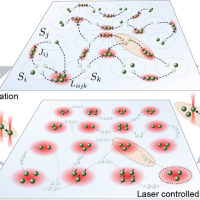News
Programmable Quantum Simulators Meet Quantum Chemistry
In an interdisciplinary collaborative effort, a team of CUA members in the Yelin, Lukin, and Yao groups joined forces with computational quantum chemists in Martin Head-Gordon’s group (UC Berkeley) to develop a novel approach to simulate quantum properties of molecules and materials on state-of-the-art atomic quantum processors.
Quantum chemistry is seen as a promising potential application of future quantum computers. While classical approximations perform well for many chemical problems, they often fail to accurately make predictions about compounds where quantum effects dominate. However, existing quantum computing approaches are prohibitively expensive to be run on near-term devices.
Addressing this challenge, the team focused on a specific class of Hamiltonians applicable to molecules where lots of open shell (valence) electrons at interact strongly, giving rise to large quantum effects including entanglement and strong correlations. Examples of molecules within this class range from catalysts for biochemical processes to magnetic quantum materials.
The proposed pipeline is tailored to solving these problems and extract chemically relevant information efficiently on near-term quantum devices. One of the core innovations the team has developed is a simulation toolbox leveraging reconfigurable atomic processors, which have been recently developed in the CUA, along with novel laser control schemes for fast logic operations and information-dense measurements for efficient readout. The combination of these features allows detailed calculation of quantum properties for models of molecules and materials on near-term-intermediate-scale-quantum-devices (NISQ). The approach is further extendible to a larger class of models within computational chemistry, which are relevant for problems ranging from drug design to determining design principles for nano-scale magnetic materials. Hence, this approach paves the way for performing advanced quantum chemistry simulations on quantum processors.
